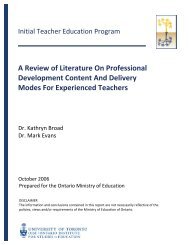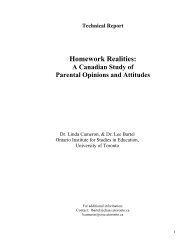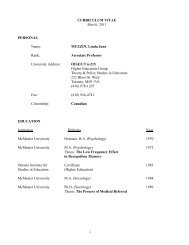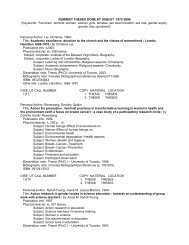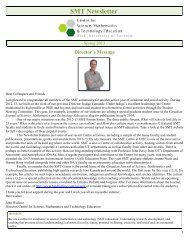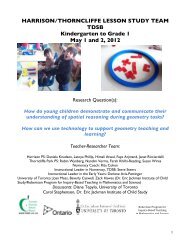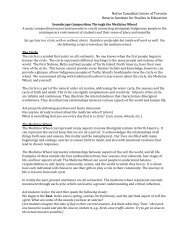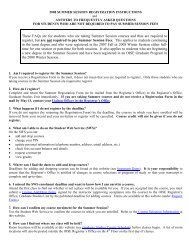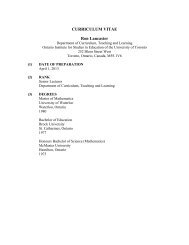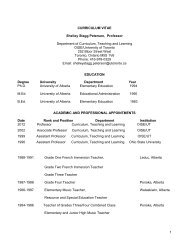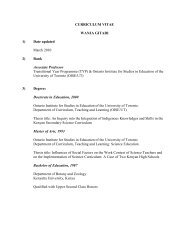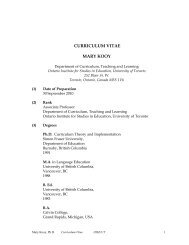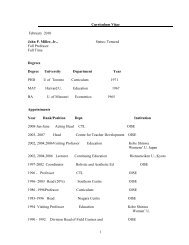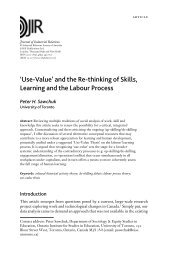The Ontario Curriculum, Grades 9-12 - Ministère de l'éducation ...
The Ontario Curriculum, Grades 9-12 - Ministère de l'éducation ...
The Ontario Curriculum, Grades 9-12 - Ministère de l'éducation ...
You also want an ePaper? Increase the reach of your titles
YUMPU automatically turns print PDFs into web optimized ePapers that Google loves.
F1.2 assess air quality conditions for a given Canadian location, using Environment Canada’s<br />
Air Quality Health In<strong>de</strong>x, and report on some Canadian initiatives to improve air quality<br />
and reduce greenhouse gases (e.g., <strong>Ontario</strong>’s Drive Clean program to control vehicle<br />
emissions) [AI, C]<br />
Sample issue: Historically, mining and smelting polluted the air, land, and water around<br />
Sudbury, <strong>Ontario</strong>. More recently, as a result of government regulations, industry has<br />
significantly reduced emissions, leading to an improvement in air quality and reversal in<br />
the acidification of local waterways.<br />
Sample questions: How effective has <strong>Ontario</strong>’s Drive Clean program been in reducing<br />
greenhouse gas emissions in the province? What are some industrial and geographic factors<br />
that might make air quality in some communities very different from that in others? What<br />
are some municipal governments doing to improve local air quality? How can public transit<br />
initiatives help improve air quality? What are the limitations of such initiatives?<br />
F3. Un<strong>de</strong>rstanding Basic Concepts<br />
F3.1 i<strong>de</strong>ntify the major and minor chemical components of Earth’s atmosphere<br />
Chemistry, Gra<strong>de</strong> <strong>12</strong>, University Preparation (SCH4U)<br />
A. Scientific Investigation Skills and Career Exploration<br />
A2. Career Exploration<br />
A2.1 i<strong>de</strong>ntify and <strong>de</strong>scribe a variety of careers related to the fields of science un<strong>de</strong>r study (e.g.,<br />
food and drug analyst, chemical safety officer, nurse practitioner, consumer protection<br />
specialist, metallurgy technologist, environmental and waste management technician,<br />
geochemist) and the education and training necessary for these careers<br />
B. Organic Chemistry<br />
B1. Relating Science to Technology, Society, and the Environment<br />
B1. assess the social and environmental impact of organic compounds used in everyday life,<br />
and propose a course of action to reduce the use of compounds that are harmful to human<br />
health and the environment<br />
B1.1 assess the impact on human health, society, and the environment of organic compounds<br />
used in everyday life (e.g., polymers, nutritional supplements, food additives,<br />
pharmaceuticals, pestici<strong>de</strong>s) [AI, C]<br />
Sample issue: Organic solvents can dissolve many substances such as paint, oil, and<br />
grease. <strong>The</strong>y are used to produce plastics, dyes, <strong>de</strong>tergents, textiles, and pharmaceuticals.<br />
However, workers exposed to organic solvents may experience long-term effects on their<br />
health. Also, solvents from industrial spills and leaks can leach into soil and groundwater,<br />
posing serious health and environmental risks.<br />
<strong>12</strong>2 Environmental Education, <strong>Gra<strong>de</strong>s</strong> 9−<strong>12</strong>: Scope and Sequence of Expectations, 2011



